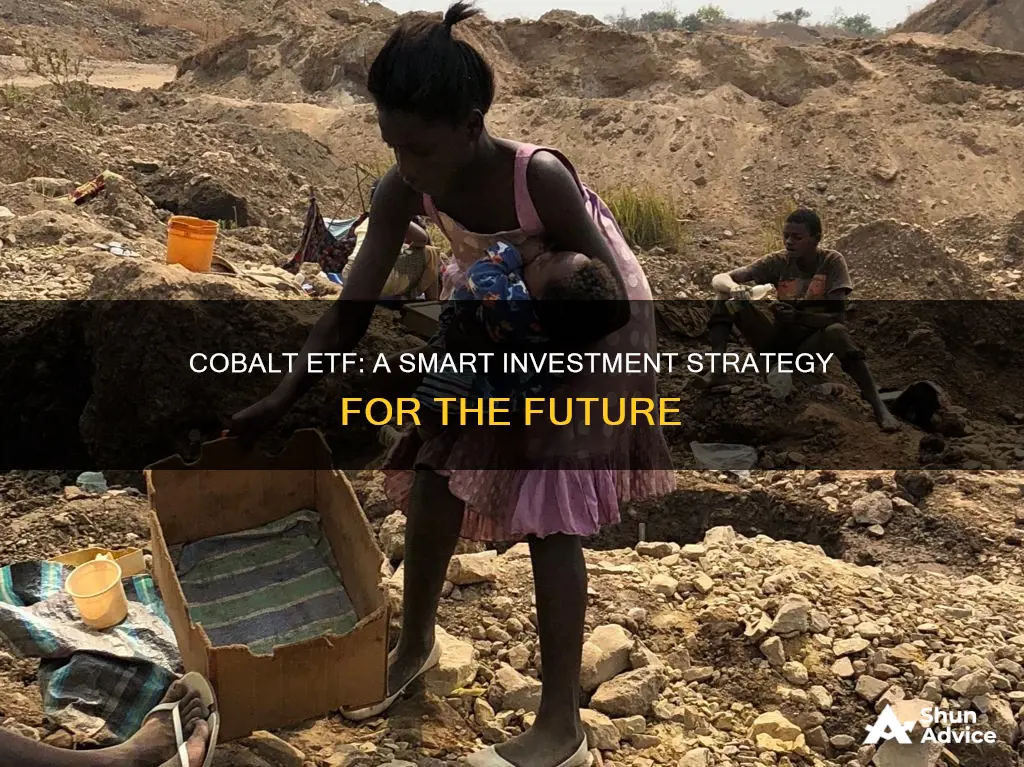
Cobalt is a metal with a diverse range of applications, from military equipment to rechargeable batteries. With the rise of electric vehicles, cobalt has become an increasingly sought-after commodity, as it is a crucial component in lithium-ion batteries. However, investing in cobalt is neither simple nor straightforward. While there are cobalt stocks and ETFs available, investors should be aware of the risks and challenges associated with the cobalt market, including supply chain issues and the potential for new battery technologies to reduce cobalt demand.
| Characteristics | Values |
|---|---|
| Cobalt ETF Ticker Symbols | PICK, BATT, ION, IEMG |
| Cobalt ETF Names | iShares MSCI Global Metals & Mining Producers ETF, Amplify Lithium & Battery Technology ETF, ProShares S&P Global Core Battery Metals ETF, iShares Core MSCI Emerging Markets ETF |
| Cobalt ETF Annual Dividend Yield % | 0.00% |
| Cobalt ETF Number of Holdings | 29, 38, 41, 2566 |
What You'll Learn

Invest in international mining ETFs like PICK or BATT
Investing in cobalt stocks is worth considering if you believe its widespread use in battery technology and renewable energy will continue. One good option is to buy shares of an international mining exchange-traded fund (ETF) that invests more specifically in businesses involved in battery tech.
The iShares MSCI Global Metals & Mining Producers ETF (PICK) and Amplify Lithium & Battery Technology ETF (BATT) are two of the best-performing cobalt-related ETFs.
PICK includes shares of more than 250 mining stocks, so it's a great way to avoid company-specific risk. It has a strong dividend growth track record and a low expense ratio of 0.39%. The ETF includes shares in precious metals, aluminum, steel, and other metals, and it tracks the MSCI ACWI Select Metals & Mining Producers ex-Gold and Silver Investable Market Index.
BATT is a smaller fund with $149.5 million in assets under management and a slightly higher expense ratio of 0.59%. It's considered a medium-risk investment, but given the growth potential of battery-driven technology, it's a good buy if your risk tolerance is somewhat high.
ETFs: Active or Passive Investing Approach?
You may want to see also

Monitor key cobalt mining companies like BHP, Vale, and Glencore
When considering investing in cobalt, it is important to monitor key cobalt mining companies like BHP, Vale, and Glencore for potential investment opportunities. These companies are some of the world's largest cobalt producers and are worth watching due to their significant presence in the industry.
BHP Group (NYSE: BHP) is one of the world's largest mining and materials producers, with operations across five continents. Based in Australia, BHP has a diverse portfolio that includes copper, iron ore, coal, and
Vale S.A. (NYSE: VALE) is another top mining company based in Brazil. It is one of Latin America's largest companies and the world's leading producer of iron and nickel. Vale is also a significant producer of other metals used in battery manufacturing, such as manganese and copper. While cobalt is not a significant revenue generator for Vale, its status as a top miner of basic metals makes it an important company to monitor. Vale benefits from its massive scale and consistently generates impressive operating profit margins.
Glencore (OTC: GLNCY) is a diversified natural resource company and the world's biggest mining company by revenue. Headquartered in Switzerland, Glencore operates in over 50 countries and serves various industries. Glencore is a leading global producer of cobalt, with operations in the Democratic Republic of Congo (DRC) through its subsidiary, Katanga Mining. In 2017, Glencore increased its cobalt production capacity through a deal with Fleurette Group to acquire additional stakes in DRC mines. The company plans to expand its cobalt output further over the next few years through investments in existing operations and new projects.
By monitoring these key cobalt mining companies, investors can gain insights into the industry, assess potential investment opportunities, and make more informed decisions about investing in cobalt stocks or exchange-traded funds (ETFs) related to cobalt and battery technology.
ETFs Revolution: Investing Transformed for the Better
You may want to see also

Understand the risks of investing in cobalt-related stocks
Investing in cobalt stocks can be challenging, and there are several risks to be aware of. Here are some key points to consider:
- Volatility of Cobalt Prices: Like any commodity, cobalt prices can fluctuate significantly due to changes in supply and demand. For example, cobalt prices rose during the COVID-19 pandemic due to increased demand for lithium-ion batteries but then fell due to oversupply.
- Lack of Pure-Play Cobalt Stocks: Cobalt is typically a byproduct of refining copper or nickel, and there are no pure-play cobalt stocks within the metal mining industry. This means that investing in cobalt can be indirect and dependent on the performance of other metals.
- Limited Listing on US Exchanges: Many cobalt stocks are not listed on US exchanges, which can make it challenging for US investors to access these investments.
- Geopolitical Risks: Cobalt production is concentrated in specific regions, with a significant portion coming from the Democratic Republic of Congo (DRC). Political instability or human rights and environmental concerns in these regions can impact the supply of cobalt and the reputation of companies involved in its extraction.
- Technological Changes: Cobalt demand is closely linked to its use in lithium-ion batteries, particularly for electric vehicles (EVs). However, new battery technologies are being developed that may reduce or eliminate the need for cobalt. If a major manufacturer adopts a new technology, it could negatively impact the demand for cobalt.
- Market Speculation: The price of cobalt is influenced not only by supply and demand but also by market psychology and speculation. This can lead to price overshooting, and investors need to be cautious about joining the market too late and experiencing negative returns.
- Company-Specific Risks: Investing in cobalt stocks may involve exposure to the performance of individual companies within the fund, especially if a single company has a significant weight in the portfolio. Poor performance or negative news related to a major cobalt producer can impact the overall ETF performance.
- Tracking Error: ETFs that invest in cobalt may not perfectly mirror the underlying index due to fees, expenses, and trading costs, resulting in a tracking error.
When considering investing in cobalt-related stocks, it is essential to carefully research and understand these risks. Diversification, setting clear investment goals, and staying informed about market trends and company-specific news are crucial for managing these risks effectively.
Creating an ETF Investment Strategy with Fidelity
You may want to see also

Explore cobalt miners with well-valued stocks
As mentioned previously, investing in cobalt is not a simple task. One way to gain exposure to the cobalt market is by investing in international mining ETFs such as PICK or BATT. These funds offer broader exposure to cobalt-related assets and can be a good option for those seeking to invest in the cobalt industry without taking on the risks associated with individual mining companies.
However, for those interested in investing directly in cobalt mining companies, there are a few well-valued stocks to consider. Here are some key companies to monitor for potential investment opportunities:
- BHP Group (NYSE:BHP): BHP Group is one of the world's largest mining and materials producers, with operations spanning the globe. Based in Australia, BHP mines metals, base materials, and energy, with copper and nickel among its top products. As cobalt is often a byproduct of refining these metals, it is naturally mined by BHP. The company has also shown interest in obtaining metals for EV batteries through its partnership with AI startup KoBold Metals. BHP Group is consistently profitable and generates strong operating profit margins.
- Vale S.A. (NYSE:VALE): Vale is a top mining company based in Brazil and is one of Latin America's largest companies. It is the world's leading producer of iron and nickel and is also a significant producer of other metals used in battery manufacturing, such as manganese and copper. While cobalt is not a significant revenue generator for Vale, its status as a top miner of basic metals makes it worth considering. Vale benefits from its massive scale and consistently generates impressive operating profit margins.
- Glencore (OTC:GLNCY): Glencore is a global mining operation based in Switzerland, producing base metals such as copper, nickel, and cobalt. It is one of the world's top cobalt producers, with mines in the Democratic Republic of Congo (DRC), Australia, and Canada. Glencore's partnership with DRC-based Katanga Mining ensures a reliable source of cobalt. However, it is important to note that Glencore is not listed on a U.S. stock exchange, and its profit margins have been lower than some of its peers.
- Freeport-McMoRan (NYSE:FCX): Freeport-McMoRan is a global mining and energy company based in Arizona. It is one of the largest producers of copper and has cobalt within its portfolio of assets. In 2019, the company agreed to sell part of its cobalt venture for $200 million but retained partial ownership of the cobalt refining business. Freeport-McMoRan has a history of generating high operating profits from its mining assets.
- Wheaton Precious Metals (NYSE:WPM): Wheaton Precious Metals is a commodity streaming company, entering into agreements with mining companies to pre-purchase metals at discounted prices. While it primarily focuses on precious metals like gold and silver, Wheaton also acquires significant amounts of cobalt. The company is profitable and pays dividends, making it attractive for investors seeking income.
- CMOC Group Ltd. (OTC:CMCLF): Formerly known as China Molybdenum, CMOC Group is a top cobalt producer based in China, the world's largest EV market. Through its copper mining assets in the DRC, CMOC Group is the world's second-largest producer of cobalt as a byproduct of refining copper. However, it is important to note that CMOC Group is not listed on a U.S. stock exchange, and purchasing its stock via the OTC market carries risks.
- Cobalt Blue Holdings (OTC:CBBH.F): Cobalt Blue Holdings is a development-stage company focused on the Broken Hill Cobalt Project in Australia. While it does not currently generate significant revenue, the successful commercialization of this project could make it a leader in cobalt production. However, the company is a penny stock and a risky investment, as its success heavily depends on getting its mining operations online.
When considering investing in cobalt miners, it is essential to remember that cobalt prices can be highly volatile, and the mining market can quickly adjust to increased demand. Additionally, cobalt is often a byproduct of nickel and copper mining, so it may not be a significant revenue generator for some of these companies.
It is also worth noting that, due to concerns about human rights and environmental abuses in the DRC, where a large portion of cobalt is mined, some investors may prefer to explore companies with mining operations in other regions.
Weed ETF Investment: Getting Started and Growing Your Portfolio
You may want to see also

Compare to investing in lithium ETFs
While there are no pure-play cobalt ETFs, investors can gain exposure to the sector by investing in international mining ETFs or monitoring key cobalt mining companies for potential investment opportunities.
Comparing this to lithium ETFs, there are dedicated funds that invest directly in lithium stocks, such as the Global X Lithium ETF (LIT). However, it is worth noting that cobalt is a critical component in lithium-ion batteries, so investing in cobalt ETFs can still provide exposure to the lithium industry.
For those interested in investing in cobalt, here are some key considerations:
- Cobalt demand is rising due to its use in electric vehicle (EV) batteries, and its price has been volatile.
- There are no pure-play cobalt ETFs, but international mining ETFs like PICK and BATT offer broader exposure to cobalt-related assets.
- Key cobalt mining companies to monitor for potential investment opportunities include BHP, Vale, and Glencore.
- Cobalt prices are influenced by supply and demand dynamics, and ethical concerns about cobalt sourcing have also impacted prices.
In contrast, here are some considerations for investing in lithium ETFs:
- Lithium ETFs hold securities engaged in various aspects of the lithium industry, including exploration, mining, and production of lithium-based goods.
- Examples of lithium ETFs include the Global X Lithium & Battery Tech ETF, Amplify Lithium & Battery Technology ETF, and WisdomTree Battery Value Chain and Innovation Fund.
- Lithium ETFs can provide targeted exposure to the lithium industry, which is expected to grow with the increasing demand for electric vehicles and energy storage solutions.
- It is important to research and compare different lithium ETFs based on factors such as fund flows, returns, assets under management, expense ratios, and dividend yields before making investment decisions.
Ally Invest's ETF Offerings: SPYDER ETFs and More
You may want to see also







